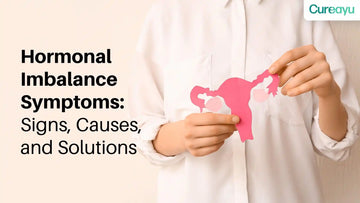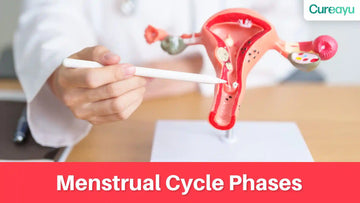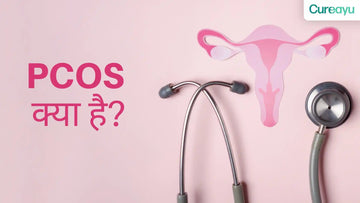Hormones are essential chemical messengers produced by various glands in the endocrine system, including the thyroid, adrenal glands, and reproductive organs. They regulate numerous bodily functions such as metabolism, growth, mood, and reproductive health. However, when these hormones are not produced in the right amounts, it can lead to hormonal imbalances, which can significantly impact overall health. Recognizing the symptoms of hormonal imbalance is key to managing and treating this condition effectively.
Also Read: A Holistic Approach to Managing PCOD with Ayurveda
What Is Hormonal Imbalance
Hormonal imbalance occurs when there is too much or too little of a hormone in the bloodstream. Even small changes in hormone levels can have significant effects on the body, given the critical role they play in regulating physiological activities. Hormonal imbalances can affect various processes, including metabolism, growth, sexual function, and mood. This imbalance can result from several factors, including lifestyle choices, environmental factors, medical conditions, and more. Understanding hormonal imbalance is crucial as it helps in identifying and addressing the root causes of various health issues.
Causes Of Hormonal Imbalance
- Stress: Chronic stress can lead to prolonged exposure to cortisol, the stress hormone, which can disrupt other hormonal functions. High levels of stress can also affect the production of adrenaline, leading to an imbalance.
- Poor Diet: Consuming a diet high in refined sugars, processed foods, and unhealthy fats can negatively impact hormone levels, particularly insulin, which regulates blood sugar. Nutrient deficiencies resulting from poor dietary choices can also impair hormone production and regulation.
- Lifestyle Factors: Factors such as lack of sleep, excessive or inadequate exercise, and exposure to environmental toxins can disrupt the delicate balance of hormones in the body. Sleep deprivation, for example, can affect the production of hormones like leptin and ghrelin, which regulate hunger and metabolism.
- Medical Conditions: Certain health conditions can directly affect hormone production and balance. For example, diabetes can alter insulin levels, thyroid disorders can disrupt thyroid hormone production, and polycystic ovary syndrome (PCOS) can lead to imbalances in sex hormones.
- Medications: Some medications, including contraceptives, hormone replacement therapies, and steroids, can interfere with the body’s natural hormone production and regulation, leading to imbalances.
Also Read: Effective Home Remedies for Period Pain
Symptoms Of Hormonal Imbalance
For Females:
- Irregular Menstrual Cycles: Hormonal imbalances can cause changes in the menstrual cycle, such as variations in cycle length, heavy bleeding, or very light periods. This is often a sign of underlying hormonal issues.
- Mood Swings: Imbalances in hormones such as estrogen and progesterone can lead to significant mood changes, including irritability, anxiety, and depression.
- Weight Gain: Hormonal imbalances can contribute to unexplained weight gain, particularly around the hips and abdomen, due to changes in metabolism and fat storage.
- Hair Loss: Excessive hair loss or thinning can be a sign of hormonal imbalance, often related to thyroid issues or elevated androgens.
- Sleep Problems: Insomnia or poor sleep quality can result from imbalances in hormones like cortisol and melatonin, affecting overall health and well-being.
- Fatigue: Persistent tiredness or a lack of energy, even after adequate rest, can indicate a hormonal imbalance affecting energy levels.
- Skin Changes: Acne, dry skin, or other skin issues can result from hormonal fluctuations, particularly in hormones like androgens and estrogen.
For Males:
- Erectile Dysfunction: Difficulty achieving or maintaining an erection can be a sign of low testosterone levels, impacting sexual health and confidence.
- Loss of Muscle Mass: Decreased muscle strength and mass can occur due to low levels of testosterone, which is essential for muscle development and maintenance.
- Mood Changes: Hormonal imbalances can lead to mood changes, including irritability, difficulty focusing, and depression.
- Fatigue: Feeling persistently tired or having low energy, despite adequate rest, can be due to imbalances in hormones like testosterone and cortisol.
- Gynecomastia: The development of breast tissue in males can result from an imbalance between estrogen and testosterone levels.
- Hair Loss: Thinning or balding can be a sign of hormonal changes, particularly related to testosterone and DHT (dihydrotestosterone).
Reasons for Hormonal Imbalance
- Age: Hormonal fluctuations are common during different life stages such as puberty, pregnancy, and menopause. These natural changes can sometimes lead to temporary or long-term imbalances.
- Genetics: A family history of hormonal disorders can increase the likelihood of developing similar issues. Genetic predispositions can influence how hormones are produced and regulated in the body.
- Environmental Factors: Exposure to endocrine disruptors like BPA, phthalates, and other chemicals found in plastics and household products can interfere with hormone production and balance.
- Autoimmune Disorders: Conditions such as Hashimoto's thyroiditis or Addison's disease, where the immune system attacks hormone-producing glands, can lead to significant hormonal imbalances.
- Tumors: Benign or malignant growths that affect hormone-producing glands can disrupt normal hormone levels and lead to various health issues.
Also Read: Understanding Ovarian Cyst Symptoms: A Comprehensive Guide
How to Fix This Hormonal Imbalance:
- Healthy Diet: Adopting a diet rich in whole foods, including plenty of fruits, vegetables, lean proteins, and healthy fats, can support hormone production and balance. Nutrient-dense foods provide the necessary vitamins and minerals for optimal hormonal function.
- Regular Exercise: Engaging in regular physical activity helps regulate hormone levels, reduces stress, and improves overall health. Exercise can particularly help balance insulin and cortisol levels.
- Stress Management: Practicing relaxation techniques such as yoga, meditation, or deep-breathing exercises can help manage stress and reduce its impact on hormone levels. Finding effective ways to relax and unwind is crucial for maintaining hormonal balance.
- Adequate Sleep: Ensuring 7-9 hours of quality sleep each night is essential for hormone regulation. Proper sleep supports the production of hormones like melatonin and cortisol, which are crucial for overall health.
- Medical Treatment: Consulting a healthcare provider for conditions requiring medical intervention is essential. Treatments such as hormone replacement therapy, medications, or other interventions may be necessary to address specific hormonal imbalances.
- Avoid Toxins: Reducing exposure to chemicals found in plastics, household products, and personal care items can help minimize their impact on hormone levels. Opting for natural, non-toxic alternatives can support better hormonal health.
Conclusion
Understanding the symptoms, causes, and treatment options for hormonal imbalance is crucial for maintaining overall health and well-being. By recognizing the signs of hormonal imbalance and making informed lifestyle changes, individuals can effectively manage these conditions. Seeking medical advice when necessary and making proactive choices about diet, exercise, stress management, and toxin exposure can significantly improve hormonal health and overall quality of life.












